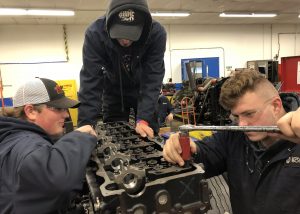News
November 8, 2018Diesel Students are in the Driver’s Seat Career Wise
Businesses that rely on large trucks and heavy equipment are increasingly having the brakes being put on business growth, sparked by a lack of diesel technicians.
business growth, sparked by a lack of diesel technicians.
The problem is a growing one, says the TechForce Foundation, a non-profit industry organization, which forecasts a demand for 28,300 new diesel technicians in each of the next 10 years. This number is well in excess of previous estimates of less than 8,000 per year.
“We’re caught in the middle of a strong growing economy, a ‘catch-up’ demand for technicians created by the Great Recession of 2008 and the increasing complexity of vehicles,” Greg Settle, TechForce director of national initiatives, told the trade journal Fleet Equipment.
While bad news for the industry, the shortage is great news for students in the Capital Region BOCES Career and Technical School Diesel Technician program, and one that puts them in the proverbial driver’s seat career wise.
“There is a lot of promise in learning a trade and there are a lot of opportunities,” said Shawn Clark, a junior from the Schalmont Central School District. Clark and classmates Aidan Enders of Duanesburg and Bradley Herrgesell of Niskayuna spent a recent weekday morning repairing an engine from a tractor trailer under the watchful eye of longtime Capital Region BOCES instructor Sam Frink.
“Growing up around engines, I have always been fascinated by big trucks and engines,” Enders said. “I like the physical aspects of it, taking a motor and outing turbos in it to make it better.”
Like many other skilled trades, the traditional pipeline funneling students into the diesel technology and other “middle skills” careers dried up in the last three decades. The result was the “Middle Skills Jobs Gap,” a national dilemma that has drawn the attention of everyone from former President Barack Obama to Congress and even television personalities like Mike Rowe.
Capital Region BOCES Work Based Learning Coordinator James Haas said he receives phone calls daily from local businesses looking for new workers.
It’s that knowledge – combined with the skyrocketing costs of a four-year college degree – that has students like Clark and his peers considering careers repairing diesel engines.
“I chose to study diesel technology because it is better than working on a regular engine … and there is a large demand for diesel mechanics,” said Alyson Cable, of Mohonasen Central Schools.
“Diesel is something not a lot of people are doing now so I thought it is a good opportunity for a career,” added Bradley Herrgesell, a junior from Niskayuna. “It’s good to learn skills that are wanted when you look for a job.”
More than 40 students from around the Capital Region are currently enrolled in the Diesel Technology program, learning the skills necessary to enter the work force or pursue further education in college or a technology school.
“There will always be a demand for repairing diesel engines. No matter how technological society gets, we will always need people to make sure trucks and trains are on the move,” Frink said.



























